The energy in your blood stream, should always be stable. If you are feeling sluggish you need energy your mitochondria can process, and healthy mitochondria to get the task done. An energy burst of glucose isn't what most of us need.
Why Do We Get Fat?
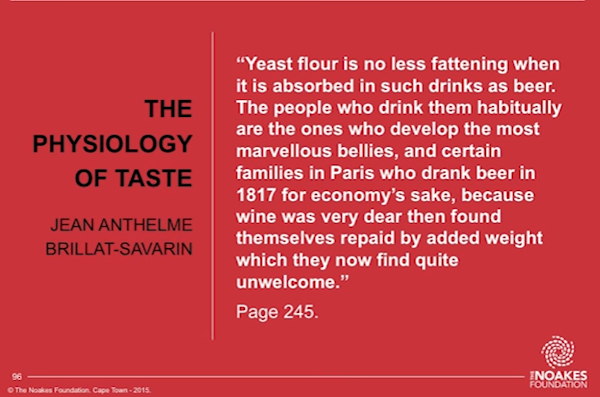
You can drink a huge amount of "energy" in a very short time. That could be in the form of sugar, or fruit juice, or a smoothie, or alcohol. Packing energy into a drink does what the Nutra Bullet advertisements say, it gives you a rapid boost of energy. That's exactly what you DON'T WANT. It causes a high spike in your glucose levels, insulin is turned "on" you get a temporary "high" as glucose is forced into your body, and fat storage begins.
Everyone knows what a beer belly looks like. It's far too easy to drink excess calories. Today, Coca Cola or other soft drinks, do the same thing, and drinking the diet version, isn't the solution.
When the glucose levels fall, you feel the "high" decline and you interpret that as hunger. So you eat again, restarting the cycle, six, eight,or ten times a day.
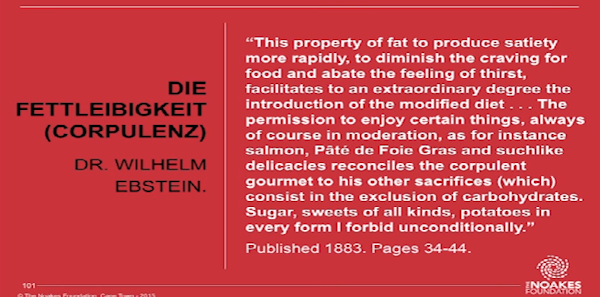
The Austrian scientist Dr Wilhelm Ebstein, in 1883, knew that all sugars and sweets, as well as bread, and potatoes; were carbohydrates and, that carbohydrates made people fat.
Ebstein also knew that when you are fats your hunger dissipated, you felt "full," your cravings were fewer, and your thirst also decreased.
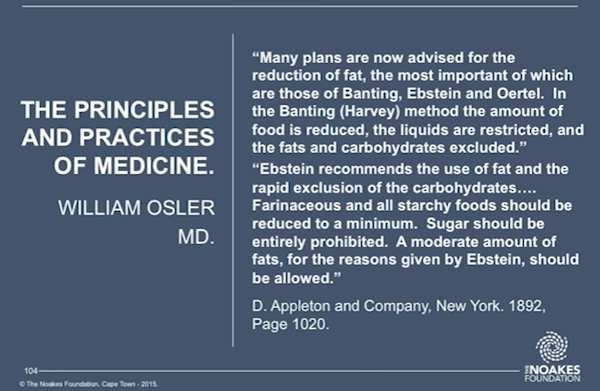
An American, Dr William Osler studied in Europe. He understood that Dr Harvey, who advised Banting about his diet, was himself confused about the role of fats and carbohydrates. Remember though that Harvey and Banting were working in the 1860's, Ebstein in the 1880's and Osler was ten years after that.
So in Europe the general principles of the Banting diet were understood before 1860, even if there was a lack of scientific evidence. William Banting didn't have the advantage of scientific knowledge. Some of his ideas were wrong. Forty years later, Dr Osler, credits Dr Wilhelm Ebstein, for getting the science right.
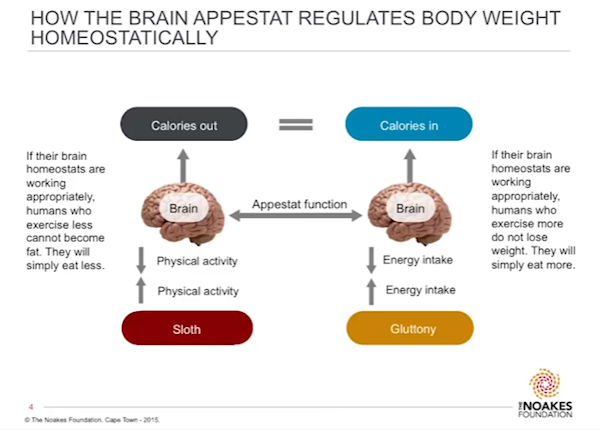
It's said that a healthy body is tightly controlled by the brain so that good health is maintained. Homeostasis is the idea that (given the lifestyle you have chosen) the body chooses "set points" for weight, sleep, blood pressure, breathing rate, all the "automatic" functions of the body.
The appestat is said to control how much you eat, perhaps also the foods you crave for, trying to find the best balance between meeting your nutritional needs, and maintaining homeostasis.
Note that the effect of exercise is unlikely to reduce your weight. You will simply eat more, to maintain homeostasis.
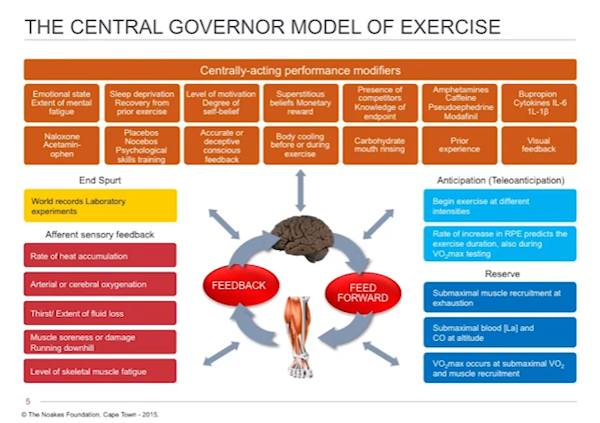
For many years Prof. Timothy Noakes worked with athletes, in high performance sports. He thinks that the brain has a "Central Governor" that both enables high performance and protects the body against doing itself severe damage by over-performing. The brain knows what a difficult task requires, and allocates the energy in such a way that you can both do well, and not cause any serious damage.
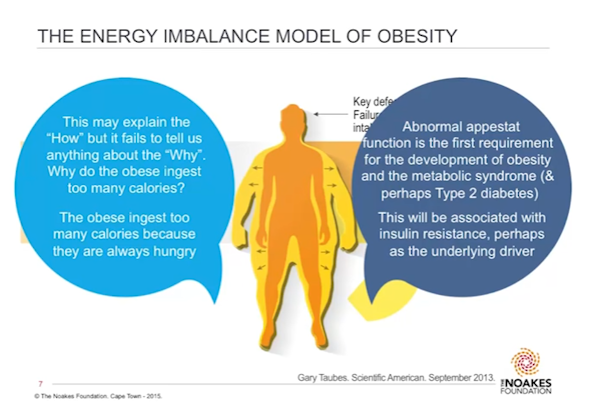
The energy in v energy out model, measured by calories, makes perfect scientific sense. It MUST be true. It's like the true but misleading claim that weight loss is almost entirely water. When your body burns fatty acids the end-products of fatty acid metabolism are carbon dioxide, water and ATP (APT is energy released for body functions.). So it's always true, when you put on weight a significant part of that weight is water, and when you lose weight a significant part of that weight is water.
Don't be put off by the comments of people who don't understand what you are trying to do, and why that is important to YOU. In the end it's your motivation, knowledge and conviction that counts, nothing else.
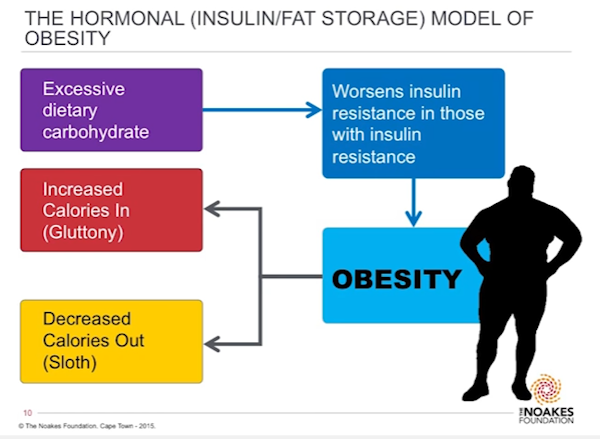
The hormone model of weight gain is a failure of homeostasis. Your body is supposed to be tightly controlled. That control has broken down. Why?
Your body tries to keep you healthy, it needs certain proteins and fats, it also needs vitamins and minerals. If you feed yourself well, your needs will be met and good health can be sustained.
But in our society many of the common foods, often the cheap and delicious foods, are carbohydrate based, and sweetened. If these foods provide most of the diet eaten, your body adapts to that lifestyle. But over time, the high level of insulin in the blood, causes a reaction against the excess pressure insulin is making on body tissues.
If you have a craving for certain foods, maybe your body to trying to tell you that it needs something. Perhaps the lack of animal protein or animal fats in your diet, creates a need to eat, but if you have it in your mind, that animal protein and fat is "bad" they you can only offer inadequate plant based alternatives. So the body does the best it can with the foods you allow it to have.

Why would anyone have too much insulin in the blood? It's the response to too much glucose, that came from your diet. Carbohydrates (starches and sugars) become glucose in the process of metabolism. Excess glucose in the blood is dangerous, and should be tightly controlled. The method of control in a healthy person is insulin, produced by the pancreas. Insulin acts like a growth hormone, using glucose for body functions, packing any surplus glucose into muscles, and storing all the additional glucose as body fat. When insulin is active in this way, burning body fat is turned off. You can't lose weight.
Over time, as more and more part of the body become saturated with energy, they body tries to stop the damage to tissues by rejecting the influence of insulin. The "glucose emergency" hasn't stopped so the pancreas makes even more insulin. Over time that damages the blood vessels throughout the body. 20 years after the problem began the doctor tells you that you've got Type II Diabetes. Suddenly the ability to control blood glucose is exposed, but it's long standing hidden issue, that you should have acted on years ago.

Prof. Noakes tell us that insulin resistance is the most under-diagnosed health problem in the world. I modern societies more than half of the population suffer from it. 90% of those think they are still healthy.
The iceberg diagram above shows the problems below the surface, that 20 years later lead to illness and death above the surface.
